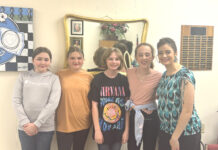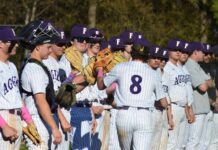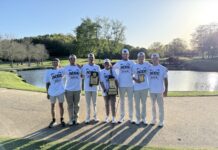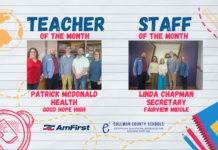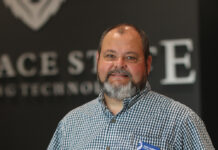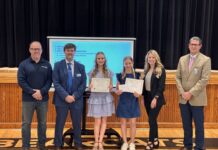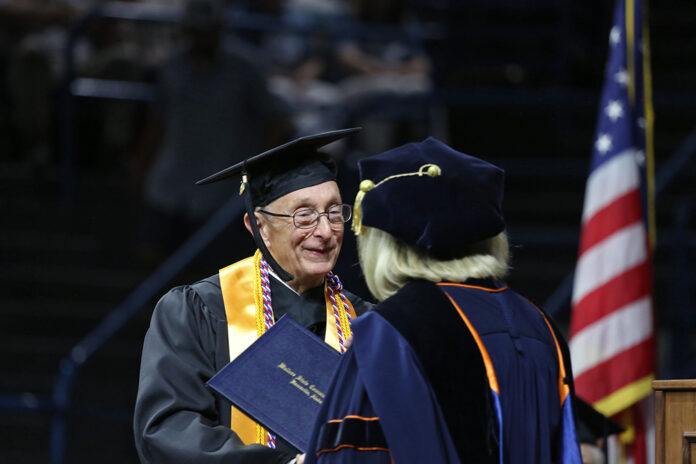
HANCEVILLE, Ala. – George Brady is a 70-year-old retired veteran from Ensley who has lived a life marked by a dedication to service and a passion for educating others. Since he was a young man, Brady has been intrigued by airplanes and always wanted to obtain his pilot’s license. After a distinguished military career and over a decade spent in classrooms as an educator, Brady chose to enroll in the Aviation/Flight Technology Program at Wallace State Community College, proving that it is never too late to follow your dreams. During the college’s Spring Commencement Ceremony, he graduated with an Associate of Applied Science degree in Commercial Airplane.
“I chose to look into the program here at Wallace State, as they have a great program that offered everything I was looking for. I decided to go for the full degree because I’m older, and even though I got my private pilot’s license at the beginning of the program, I wanted to go the full nine yards to get as much training as I could,” said Brady. “Everybody at Wallace State was so warm and inviting when I first started exploring the program, and they helped explain all the options made available to me. From the start, I just knew that it would be a great experience.”
For most of his career, Brady served in the United States Army and the Alabama Army National Guard until he retired in 1999 at the age of 46. Following the attacks on the World Trade Center on Sept. 11, 2001, he was placed on the retiree recall list.
“After 9/11, I was recalled and went to Afghanistan in 2004 and then once again in 2010. I spent one year over there each time,” said Brady. “I already had a degree, so when the military started sending me information about the Post-9/11 GI Bill, I sort of blew it off at first, but then they sent a letter telling me I could use it for aviation. I had accumulated 24 months’ worth of academic credit hours by that time, so like a lot of my fellow veterans, I used my Post-9/11 GI Bill to go back to school and study aviation.”
Before enrolling in the Aviation/Flight Technology program at Wallace State, Brady furthered his education and obtained three degrees with plans to teach college courses as an adjunct professor.
He received a bachelor’s degree in mathematics with a minor in history from the University of Alabama at Birmingham (UAB). Years later, while stationed in Montgomery, he earned a Master of Liberal Arts degree with a dual instructorship in English and Sociology from Auburn University at Montgomery. Following his retirement from the United States Army, Brady received a Ph.D. in Curriculum and Teaching Social Sciences via the School of Education at Auburn University, but as he was finishing his dissertation, he was notified that he would be recalled and deployed to Afghanistan.
“It took me a bit longer than I expected to write my dissertation, and when I was wrapping up my studies at Auburn, I got the notification that I was going to be recalled. I was able to finish right before I was deployed to Afghanistan,” said Brady. “I came home, got a little rest and found some teaching jobs until I was recalled once again. Following my second return home, I began teaching online courses.”
After his two recall deployments to Afghanistan, Brady devoted himself to being an educator. During his teaching career, Brady taught mathematics, history and sociology at three different colleges and universities.
Brady worked as an adjunct professor of mathematics at Virginia College from 2006 to 2009. During this time, he also taught history at UAB from 2007 to 2010. Starting in 2009 and following his second recall in 2010, he taught history and sociology at the University of Phoenix Online until 2018, before setting his sights on the Wallace State Aviation program.
Brady said the Wallace State Aviation/Flight Technology program laid a solid foundation for all he needed to become a pilot, ensuring that he not only obtained appropriate instructional training, but that he also had plenty of practical flight hours under his belt.
“I would have to say my favorite aspect of Wallace State was the excellent flight instruction and training I received. With all the practical coursework, the program prepares students to go out into the field. It is a good starting point as student pilots can get all three forms of aviation licensure, including their private, commercial and instrument rating,” said Brady. “I think it set me up nicely, especially if I wanted to go further into commercial aviation.”
Brady said he enjoyed every moment he was seated in the cockpit, but his favorite trips were the long cross-country flights required to obtain commercial pilot certification.
“In the Aviation program, you must complete cross-country, solo and dual flights, as there are a certain number of flight hours required for different licenses. Some of the trips are dual with an instructor, but when you get into commercial, it’s mostly on your own. Some flights are short, and some are longer, with a minimum of 50 miles from the airport for most of them,” said Brady. “A long cross-county flight requires a minimum of 300 miles, and they certainly were one of my favorite parts of the program.”
The one trip that sticks out most in Brady’s mind was a long cross-country flight he took from the Cullman Regional Airport in Vinemont to Arkansas.
“For their cross-country flights, a lot of people like to fly to the Gulf Coast, but when I planned to head down there, we were having bad storms, and I didn’t feel comfortable making the trip, as storms and small planes don’t really mix,” said Brady. “Instead, I ended up going on one of my favorite trips which was a long cross-country flight to Pine Bluff, Arkansas. I loved getting to fly over the Mississippi River and see the Delta region, and it was kind of peaceful being all by myself, so high up that I could see everything. I know a lot of people love to fly over the big cities, but I have always preferred the countryside. I got to see the rains and the storms off in the distance, and it was just so beautiful.”
Brady said he enjoyed learning from the Aviation/Flight Technology instructors and that their diligent teaching methods impacted him.
“All of my instructors in the Aviation program at Wallace State were very, very good, and I truly enjoyed getting to learn from them. The faculty and staff members were all very helpful, and the Aviation program at Wallace State does a good job of teaching students the basics of flying,” said Brady.
Bert Mackentepe, department chair for the Aviation/Flight Technology program at Wallace State, said Brady stood out not only in his desire to excel in his studies, but also in how he interacted with his peers in the program.
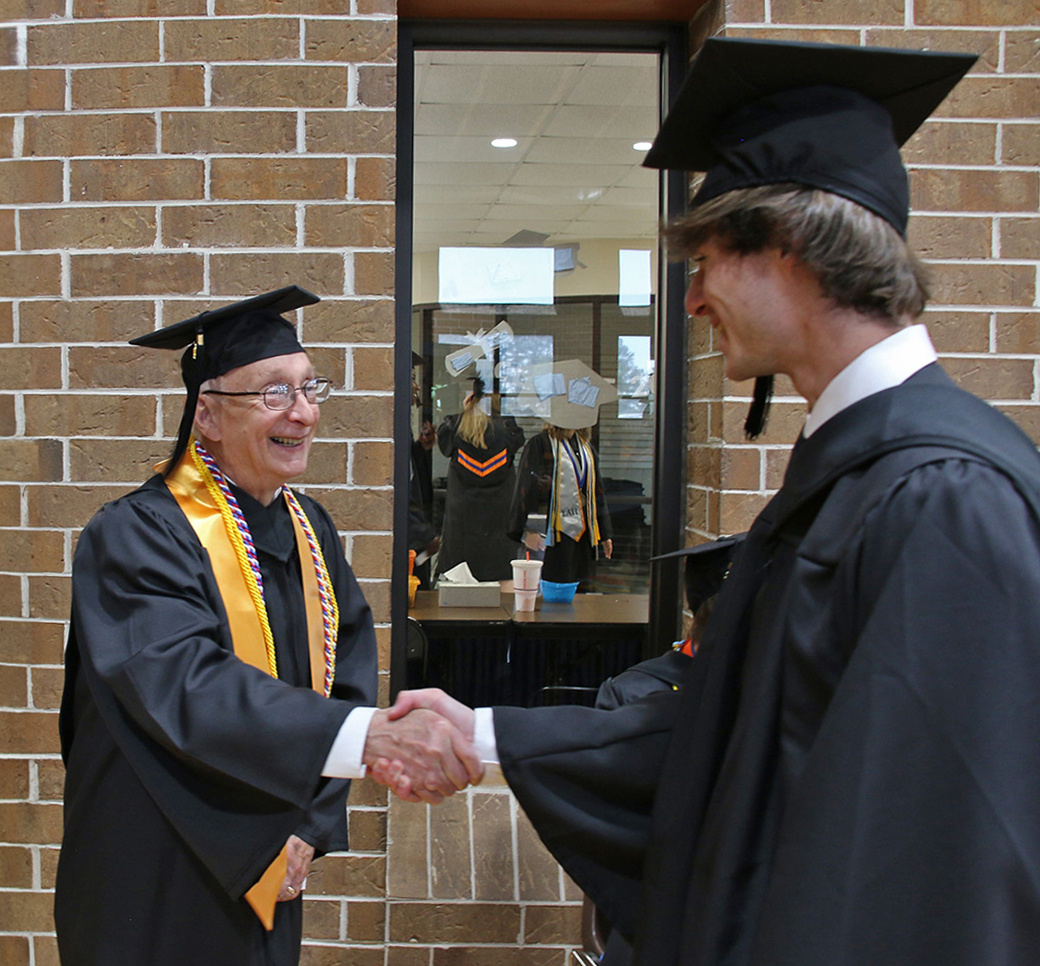
George Brady with a fellow student (Wallace State)
“When it comes to taking on new opportunities, he is wide open and can do just about anything he decides to do. He went through our program from start to finish and got his private, instrument and commercial ratings. He is a good pilot who was always prepared, knew what he needed to do and took instructions very well. They don’t just give away pilot certificates, you have to earn them, and he certainly put a lot of work and effort into all he did here,” said Mackentepe.
“He is humble and jovial, and it really was a joy to have him come through the Aviation program. In fact, he was a mentor to some of the younger students. A lot of times, we don’t see many older adults that are interested in learning how to fly, so he acted as a beacon to people that did want to come in and learn. He is a very unique individual, but I believe if there were more people in the world like George, there would be fewer problems,” said Mackentepe.
In addition to the required flight hours and the connections he made with instructors and classmates in the Aviation/Flight Technology program, Brady said he enjoyed getting to spend time in classes on Wallace State’s Hanceville campus.
“For me, it is hard to pick a favorite course during my time at Wallace State as I really did enjoy it all, but as far as my favorite non-aviation class, I most enjoyed my time in a Speech class called Fundamentals of Oral Communication. Halfway through the semester, the class got cut short due to COVID when we had to stop in-person studies, but I still enjoyed it. The instructor, Gayle Ledbetter-Crocker, was a great teacher. She was very good, very dynamic and the kind of instructor I would want to be,” said Brady.
Outside of flying planes, learning new things and teaching others, Brady enjoys taking on various projects around the house.
“In my free time, I like to build things. My wife, Deborah Jean, and I live on the river, and we built a lot of our house ourselves. Not too long ago, we built an outdoor pavilion and enclosed it. In fact, I was bringing in an air conditioner to install in our new pavilion earlier today,” said Brady. “We are water folks besides air folks, so Deb and I also have a sailboat at Lake Guntersville and really love to sail. My wife has been a huge help in my life and has helped me do all these things.”
Now that he has received his degree, Brady still flies regularly to continue practicing and stay current as a pilot. He encourages anyone that is interested in pursuing their dreams to take the first step and not look back.
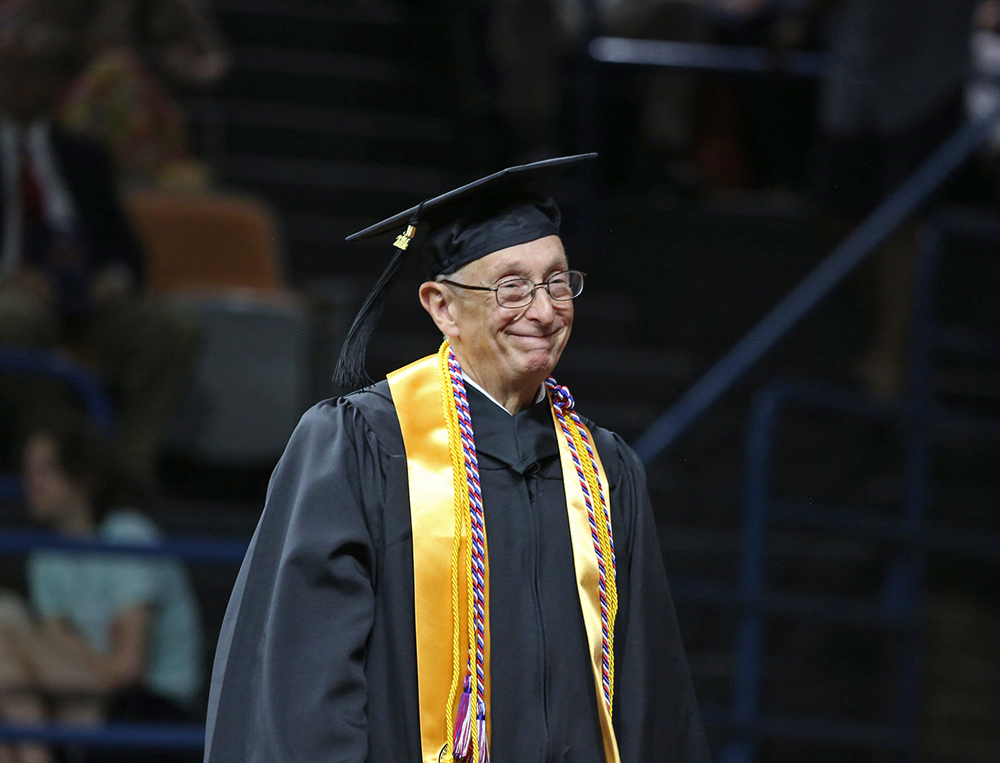
George Brady (Wallace State)
“Go for it, because you really can do it. I was 46 when I retired from the military, and I was going to have to find something else to do or I would have driven my wife crazy. I decided to teach once I retired, and that’s why I finished my master’s and Ph.D., but while I had planned to teach all along, I believe you can even change your original path like I did with aviation. In some cases, it may be very easy,” said Brady. “People do it every day. I watched five of my good friends retire at the same time as me – some younger, some my age and some older – who went forth and did the things that they set their minds to. I say go for it because I truly do believe that you can do it.”

